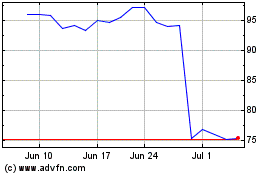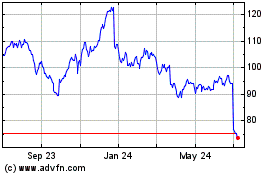By Eva Xiao
HONG KONG -- The world's largest clothing brand, Hennes &
Mauritz AB's H&M, is under assault in China, one of its biggest
markets, over its stance on forced labor in the country's remote
cotton-producing region of Xinjiang.
Chinese state media and social-media users excoriated the
Swedish fast-fashion giant in an explosion of anger on Wednesday,
accusing the company of spreading rumors and smearing China over a
statement it made last year on forced labor in China's northwest
Xinjiang region.
Searches for the H&M's name on China's biggest e-commerce
platforms were blocked on Wednesday, while internet users took to
China's Twitter-like Weibo to call for boycotting the company,
which operates more than 400 stores in China. Two of the fashion
company's Chinese brand ambassadors also announced they were
cutting ties with H&M over what was called its smearing of
China.
Alibaba Group Holding Ltd., Pinduoduo Inc., and JD.com Inc.,
which run the e-commerce sites blocking H&M, didn't immediately
respond to a request for comment.
"Spreading rumors to boycott Xinjiang cotton while trying to
make money in China? Wishful thinking!" wrote China's Communist
Youth League in a post on Weibo that was forwarded nearly 30,000
times and attracted around 10,000 comments.
Western companies "should not be involved in this ideological
conflict between China and the West under any circumstances," Hu
Xijin, editor-in-chief of nationalist tabloid the Global Times,
wrote in his own post on the platform.
The outrage appears to be in response to a statement the company
issued last year expressing concern about reports of forced labor
and discrimination against ethnic minorities in Xinjiang. H&M
said in the statement that it didn't source products from the
region and that it strictly prohibits forced labor in its supply
chain, regardless of country.
On Wednesday, in response to the backlash, the company said it
followed international guidelines for sustainability and that its
supply chain principles "did not represent any political
position."
"We are committed to long-term investment and development in
China," the company posted on its official Weibo account, adding
that it cooperated with more than 350 manufacturers in China.
H&M reported sales of more than $1.1 billion in China in
2020 despite a drop in store traffic because of the coronavirus
pandemic. That places the country among its four largest markets,
according to the company.
It couldn't be determined why the company faced the sudden
onslaught over comments it had made in the past.
The backlash against H&M nevertheless highlights how
multinational companies are being squeezed in an intensifying,
high-stakes clash between Beijing and Western governments over
human rights.
Earlier this week, China announced sanctions on more than a
dozen individuals and entities in the European Union after the
European bloc slapped sanctions on four Chinese officials for
human-rights abuses in Xinjiang, where Beijing has carried out a
repressive campaign against the region's mostly Muslim ethnic
minorities that includes internment, extrajudicial detention, and
forced labor.
Beijing has denied all allegations of human-rights violations in
Xinjiang, instead describing the vast network of internment camps
as vocational training centers aimed at countering terrorism and
religious extremism.
In recent months, Chinese officials have become more aggressive
in pushing back against criticism of Beijing's policies in
Xinjiang, including using social media to personally attack foreign
scholars studying the region.
That is forcing Western brands like H&M with lucrative
businesses in China to pick a side. In January, U.S. Customs and
Border Protection issued a ban on all cotton and tomato products
from Xinjiang, placing the burden of proving the absence of forced
labor on importers.
H&M was among several Western companies identified in a 2019
Wall Street Journal investigation of businesses that had grown
entangled in China's campaign to forcibly assimilate Xinjiang's
Turkic minorities.
In addition to H&M, Chinese online users took aim at other
international apparel brands that were members of the Better Cotton
Initiative, a nonprofit organization that certifies farms according
to its cotton sustainability standards.
Last year, the U.S. Commerce Department blacklisted a Xinjiang
subsidiary of one of BCI's members, Chinese yarn producer Huafu
Fashion Co. Ltd., for being complicit in the region's human-rights
violations. In October, BCI announced that it was suspending
licensing of farms in the northwest region.
The organization's membership includes Nike, Adidas, and IKEA,
all of which were targeted over their affiliation with BCI on
Chinese social media on Wednesday.
Better Cotton Initiative didn't immediately respond to requests
for comment.
On Chinese social media, users also called for kicking H&M
out of China entirely, and various hashtags associated with the
company were trending in the top-10 list, garnering a hundred
million views within four hours.
"A low-end overseas brand runs to China to make a lot of money,"
wrote a user. "Hurry up and expel it from China! Get out,
H&M!"
Chinese actor Huang Xuan's decision to sever ties with H&M
topped the list, with almost 500 million views and received more
than 140,000 likes within less than five hours. In a post on Weibo,
the Chinese actor's studio said it was "resolutely opposed" to any
attempts to discredit China.
--Sha Hua and Keith Zhai contributed to this article.
Write to Eva Xiao at eva.xiao@wsj.com
(END) Dow Jones Newswires
March 24, 2021 12:00 ET (16:00 GMT)
Copyright (c) 2021 Dow Jones & Company, Inc.
Nike (NYSE:NKE)
Historical Stock Chart
From Mar 2024 to Apr 2024

Nike (NYSE:NKE)
Historical Stock Chart
From Apr 2023 to Apr 2024
